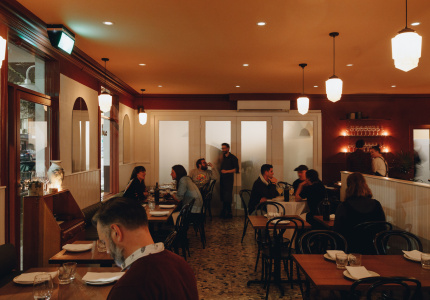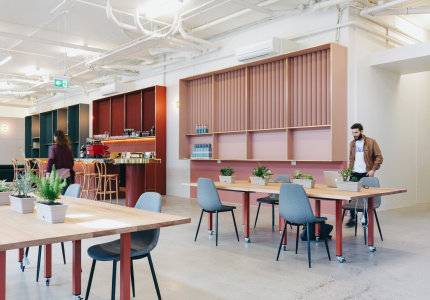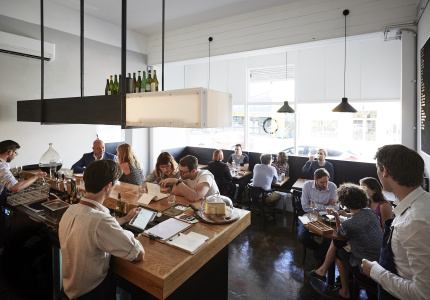Worksmith occupies the ground floor of a new development at the factory outlet end of Smith Street in Collingwood. It announces itself discreetly with dark, barely translucent tinted windows set behind concrete and steel. Two small white “Worksmith” logos are eclipsed by a bright green “sale” sign plastered above on the building’s portico.
We Can Work It Out
By giving people a chance to collaborate instead of compete, Worksmith wants to democratise the wisdom and expertise usually held by food and drink veterans. They’re only a year in, but founders Michael Bascetta and Roscoe Power are dreaming big to bring about real, positive change in Australia’s restaurants, cafes and bars.
Inside it’s a different story.
If you’ve ever worked in a bar or restaurant, you’ll know that the manager’s office is always one of the dankest places in the building. It usually has modest dimensions, often no windows or plants, and almost always a nauseating fluorescent light flickering overhead.
For many of its members, Worksmith – a hospitality-focused community hub and co-working space – is a much-deserved refuge from that. The large open space, designed by architect Chris James, is as bright and airy as any cafe in the city. A mix of single and group desks, which at full capacity can accommodate 65 people, are scattered around a large and impressive spotted gum bar, where members enjoy endless cups of Five Senses coffee, Capi sparkling mineral water and various spirits, some of which are supplied by resident members.
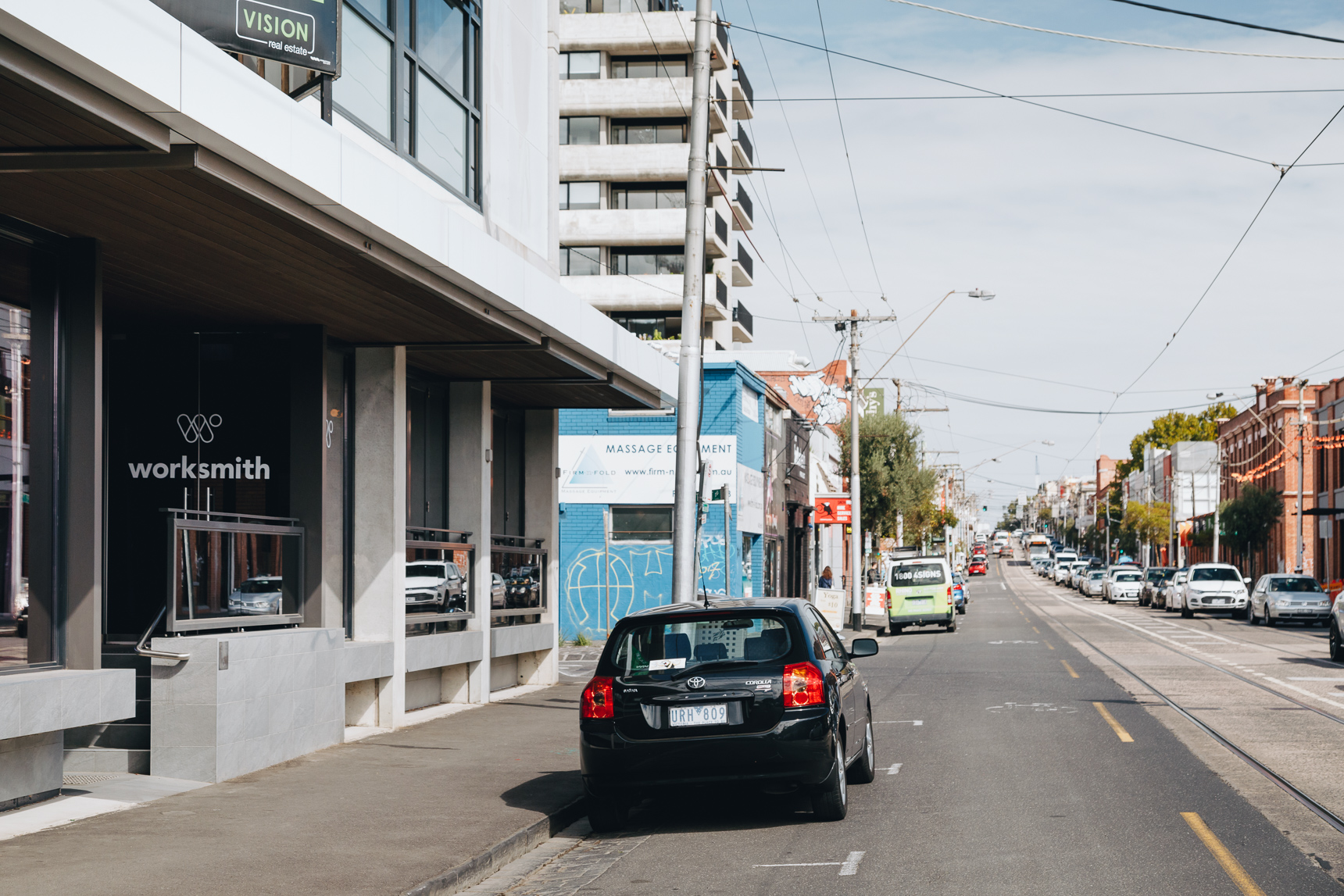
When I meet founders Michael Bascetta and Roscoe Power inside, they’re dressed almost identically in white T-shirts, shorts and thongs. It’s immediately obvious they’re old friends. Sure enough, they tell me they first worked together at age 14, serving dodgy lattes in Melbourne’s eastern suburbs.
They came together for this project after Power, whose background is in property development, saw the space come up and approached his old friend. Bascetta had recently co-founded one of the city’s best wine bars, Fitzroy’s Bar Liberty. With the same team, he also launched Italian-American diner Capitano in Carlton late last year. And before both these projects, Bascetta spent three years as assistant manager at Ben Shewry’s internationally revered restaurant, Attica.
Worksmith is about democratising the kind of wisdom and equipment found in benchmark businesses such as these. The goal is to foster Australia’s best hospitality talent, no matter who they are or where they’re from. This has implications not just for those working in food and drink, but for anyone who loves eating and drinking out.
“Everything that Worksmith is and wants to be is what I would have needed 10 years ago, when I knew no one in Melbourne,” Bascetta says. “There’s so many people that want to do great things and they don’t know where to start – where to study, where to work. We give them access to equipment, training and education – we really speed up that process for them. There’s so much IP [intellectual property] floating around restaurants and bars, but they’re closed doors and [virtually] no-one has access to that.”
As far as Power and Bascetta know, this is the only co-working space in the world that focuses exclusively on hospitality. And they’re leveraging that position: in June they opened a second Worksmith inside Ella, a food and drink precinct in the city. They’re also working with developers to open a Sydney branch by the end of 2019, with plans to launch one in Singapore in the future, which would act as a crossroad for the Asian-Australian food and drink industry.
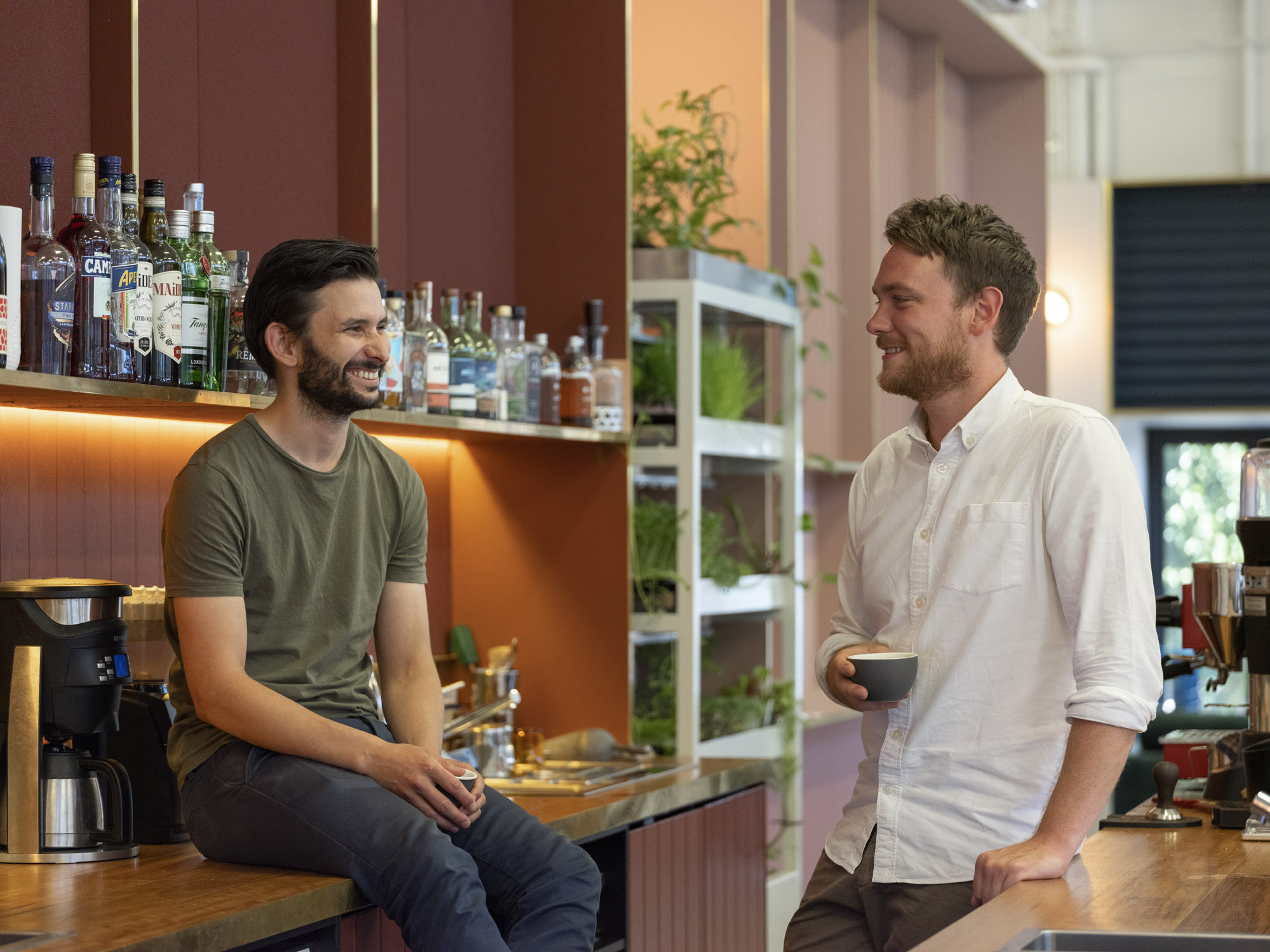
The time is right. Co-working is an ever-expanding global industry of open-style office spaces that, for a price, provide a comfortable and connected place to work. Over the past decade or so this industry has grown to cater to all types of modern professionals: office-less freelancers who want a quiet and practical place to work, startups that want to save on overheads but don’t want to work out of a garage, itinerant creatives tired of paying for wi-fi by buying coffee, and so on. Bigger companies such as We Work run modern and brightly dressed offices occupied by row after row of coffee-sipping professionals typing away in ergonomic bliss. In January the nine-year-old company was valued at $47 billion, and had 500 locations around the world, including five in Melbourne.
Co-working spaces can be hit-and-miss. The worst are devoid of the more substantial benefits offered by better venues, providing merely the basics: desks, tea, coffee and unfettered wi-fi (which, in a city like Melbourne, is available everywhere anyway). So it’s revealing when Power tells me about the time he spent travelling the world sampling co-working spaces as a part of the US-based Remote Year program. After several months and dozens of spaces, he says he finally homed in on what he calls a “good co-working” philosophy: “Develop a business surrounded by peers in your industry.”
The kind of relationship building that Worksmith fosters “can happen organically [in the hospitality industry], but not frequently,” Bascetta adds. “It takes a long time to form relationships in this industry – hospitality can be a bit closed-circuit and can take a while to crack. Getting everyone in the same room makes it a hell of a lot easier to develop those relationships.” The business caters to the full spectrum of people in the industry: restaurant managers, distillers, wine importers, produce suppliers, PR agents, food photographers, point-of-sale operators, itinerant chefs and so on.
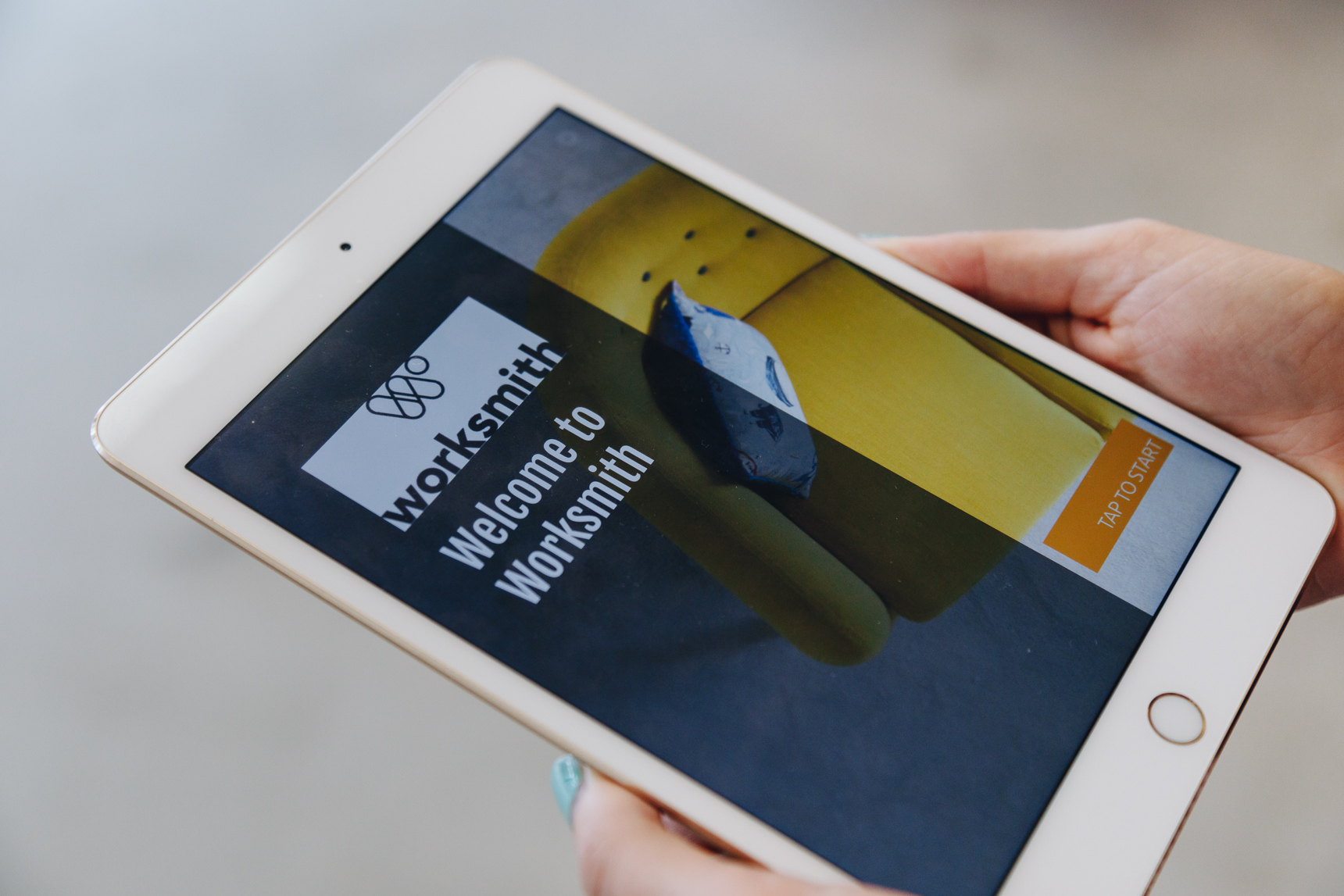
Bascetta first noticed demand for a Worksmith-style concept at Grow Assembly, a TED-style hospitality forum he co-founded in 2017 with other industry people to look at ways to improve their lot. The first conference was at Abbotsford Convent and included speakers such as world-renowned bartender Alex Kratena of London cocktail bar Artesian, David Blackmore of Blackmore Wagyu and Astrid McCormack of New South Wales restaurant Fleet.
“People were craving this knowledge and space to work in,” Bascetta says. “No one said, ‘Open a co-working space for hospitality.’ But on one side you’ve got the explosion of co-working spaces around the world, and we realised there was a huge uptake in Melbourne. And on the other side, opening Bar Liberty and becoming part of the fabric of the Melbourne food and wine scene, there was this great community but they weren’t supported enough, from training and education to inspiration to having their own work space.”
The Worksmith team now includes Rachael Dougherty, event manager, and Rob Weston, operations manager. Orlando Marzo (ex-Lûmé) recently joined as beverage director. After winning Diageo’s prestigious Global Bartender of the Year in 2018, Marzo could have opened a bar anywhere in world, but decided to join Worksmith instead because he felt the opportunity to “share the knowledge [and] inspire the next generation” was broader.
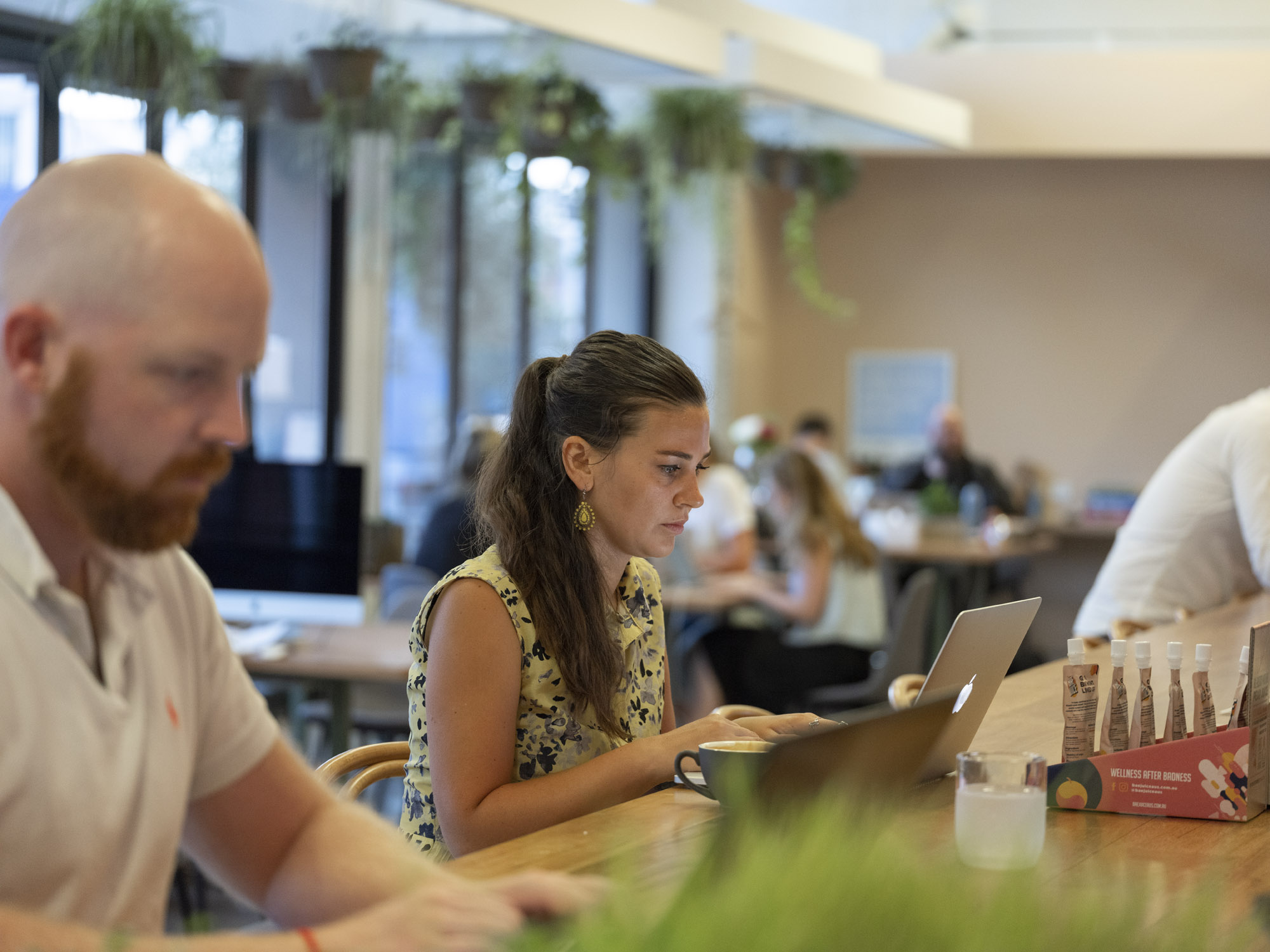
As Worksmith’s red La Marzocco coffee machine steams and grinds away nearby, Power assures me that although their ultimate goal is for Worksmith to become a “single touchpoint” for anybody in the hospitality industry, their focus for now is still on making the concept work here. He motions to Marzo, who’s meeting on a nearby table with another member, Luke Whearty. Whearty and his wife Aki Nishikura are behind Operation Dagger, one of Singapore’s top bars and the 23rd best in the world for 2018. Later this year they’ll open their second bar, Byrdi, inside Ella. Power tells me proudly the two bartenders are “collaborating on concepts”. Bascetta adds that a meeting like this would normally take place in a bar over a few drinks. But he thinks it’s better like this, “Bringing more professionalism to the industry.”
We keep walking and pass a small meeting room and soundproofed podcast studio. In February, Worksmith held a talk with East London Liquor Company founder Alex Wolpert, who grew his small east London distillery to a 40-employee company that exports to more than 20 countries and recently crowdfunded close to $3 million to expand its operations. Events such as these will soon be broadcast for free on a media platform Worksmith hopes to launch by mid-year.
We reach the latest and perhaps most necessary addition to the space, a fully functional test kitchen. Fitted out with large industrial fridges, electric cookers, deep fryers and a combi oven, the kitchen speaks to Worksmith’s core concept. Bascetta and Power say it’s both a practical place for members needing space to prep food, and also a space for members to workshop concepts before putting them into production or on a menu. “To refine their concept so when they open they know exactly what they’re doing,” Power says.
It’s in this spirit that members – some using the space permanently, others casually – are encouraged to look at their desks as a starting point for what the space has to offer. Culinary incubator The Business of Food has been co-working at Worksmith for several months and recently started to use the kitchen to test products for clients such as Eat Sweet, a French-style nougat producer, and The Hidden Souk, a spice producer. Another member, the Social Food Project, is using the kitchen for its catering operation.
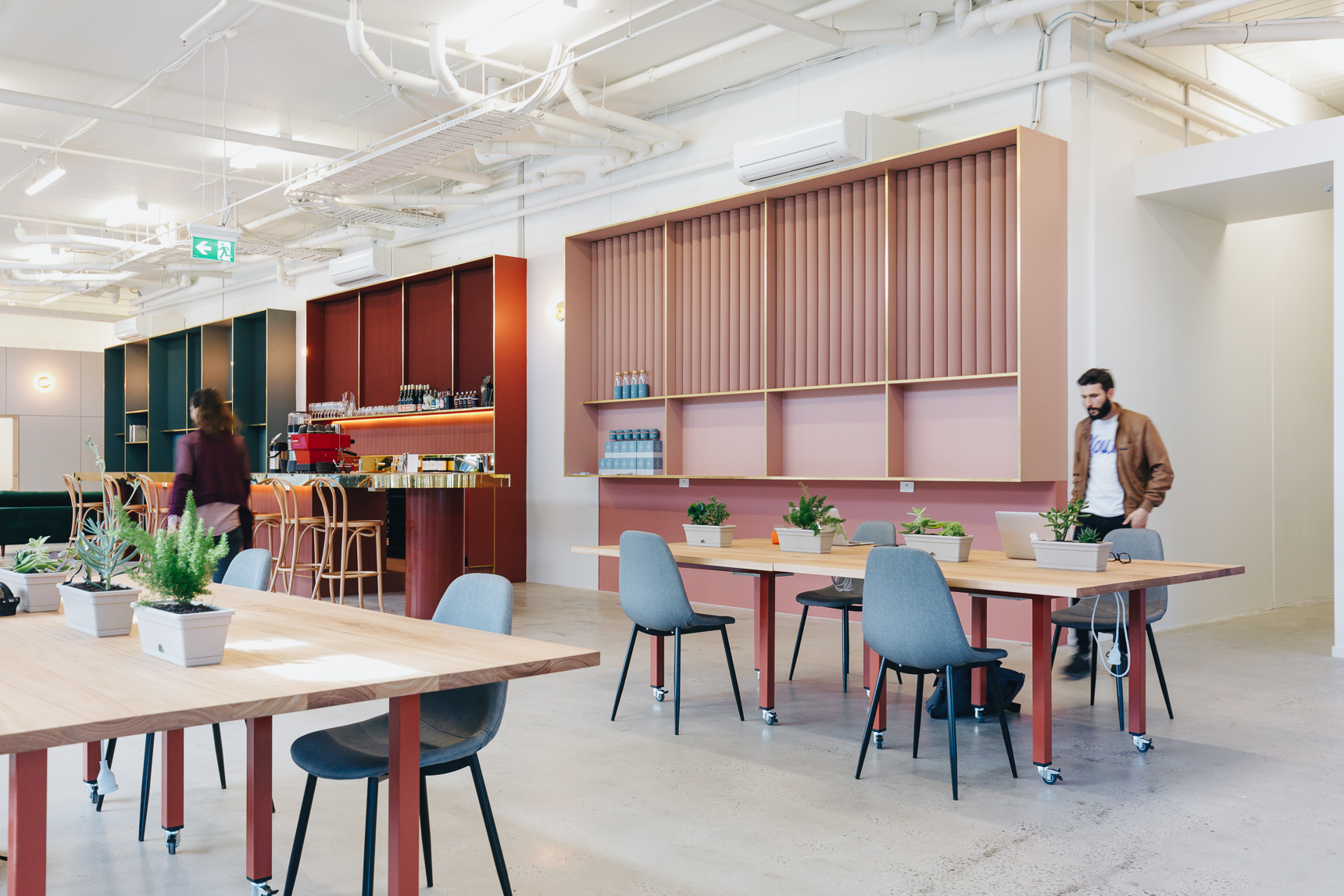
But where the Collingwood site is focused on food, the newer location at Melbourne Central is all about drinks. Orlando Marzo is heading up Worksmith’s ambitious new $150,000 test bar, which will give Melbourne’s drinks community the opportunity to use costly equipment they could never access otherwise, and collaborate and innovate alongside members such as Marionette Liqueur and partners such as RMIT, with which Marzo is currently investigating the ways sound and light may or may not influence taste.
One of several high-tech gadgets includes a $22,000 rotary evaporator, which uses a vacuum to lower the boiling and evaporation point of liquids. The machine allows delicate ingredients such as fruit and vegetables to be “cooked” without damaging them, and their essences to be captured. The kitchens at Attica, Dinner by Heston and Press Club are three high-profile places already employing these “rotovaps” for culinary alchemy. Worksmith’s test bar will allow smaller players to access these machines.
Marzo is also partnering with Worksmith to open a separate public bar. Bascetta says this will be a sort of prototype for the “turnkey” potential of Worksmith: partnering with members to create businesses from scratch, and working with developers and venture capitalists to provide more opportunities for hospitality entrepreneurs.
“We see all these opportunities with venture capital and property developers that want to be involved in food … people that want to invest in food and drink but don’t know where to start. They often use a language that the industry isn’t going to align with. We can help translate a lot of that so people are getting that opportunity, whether it’s to open a new venue or get capital.”
This sort of thing gets to the heart of what Worksmith is about. As much as it aims to connect people already inside hospitality, or those hoping to work in it, it’s about opening up the industry to outsiders. “It’s happening across a number of industries,” Power says. “People are recognising that you can build your business quicker and better through collaboration over competition.”
He points to three Worksmith members – gin producers Four Pillars, Archie Rose and Cedar Fox – which, although competing in Australia’s nascent gin market, also work alongside each other, sharing ideas and sometimes putting on events together. “The way they look at it is, they’re all fighting the same fight,” Bascetta says, noting that Australian gin only represents a minor percentage of global sales. “If we want to make that a bigger number, we’re going to have to work together.”
Four Pillars’ Jennifer Bailey, who works with a small team on a table bearing the company logo, found out about Worksmith through industry contacts and was drawn to the sense of community. “The idea of being surrounded by like-minded industry folk – be it journalists, restaurateurs, graphic designers, wine importers or other spirit producers – was very appealing, and we have definitely enjoyed the networking opportunities that are quite unique to Worksmith,” she says.
For someone outside of hospitality, Worksmith might not seem particularly important. But a space and project aimed at fostering talent and innovation ultimately benefits the dining public, who gets to enjoy the fruits of their work. It’s also a potential panacea for the hospitality industry’s many ills: inequitable or illegal pay, poor mental health, dysfunctional or outdated systems, absent or underused resources. These problems are largely hidden from customers, so they persist.
Worksmith’s event manager Dougherty regularly runs workshops dealing with issues such as these. Seminars address everything from mental health and employee contracts, to cheesemaking, social media and branding. Earlier this year the team ran an industry feedback seminar asking participants to list the three things they didn’t like about the industry, and potential ways to fix them. “Some big things came out of that,” Bascetta says. People in the industry are “screaming out” for knowledge and resources – everything from how to access standard financial documentation to human resource support and how to find a reliable builder, architect or accountant.
A recent workshop hosted by an Australian Hotels Association psychologist and a chef looked at mental health in the industry. They discussed the correct ways for an employer to respond to an employee’s bad behaviour, and when it’s right for an employee to approach Worksafe. “Sometimes people are a little bit afraid to discuss these things,” Power says, “but within the community there’s support to talk more openly.”
While all this knowledge sharing is meant to improve the lives of industry folk, it’s also bound to improve diner experiences in ways big and small. In the short term, a happy, properly paid waiter is likely to provide better service, for example. And looking at the bigger picture, a more functional and professional industry should in theory retain more workers and legitimise what’s often seen as a layover on the way to other vocations.
While Worksmith’s initiatives are undeniably valuable and necessary, it remains to be seen what real, noticeable effects they might have in our notoriously tough market. And ultimately, it’s this litmus test that will determine if we’ll ever see the Worksmith logo in Singapore and beyond.
I ask Bascetta and Power if they think their concept would have worked 10 years ago, and they each offer a resounding “No”.
“Ten years ago the industry was more fragmented. Fast-forward to five years ago and people were starting to understand that collaboration over competition is something they could get around,” Bascetta says.
“Now you’ve got chefs going overseas or interstate to do pop-ups or collaborations with other chefs. To grow as a company or as a product or whatever you’re doing, it’s really important to come together with like-minded people.”
Worksmith
450 Smith Street, Collingwood
0481 951 274
worksmith.io
This story originally appeared in Melbourne Print Issue 25. This article was updated on July 24, 2019.

